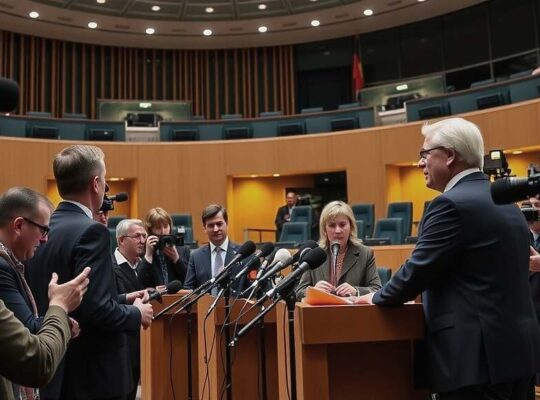Germany’s leading trade unions, IG Metall and Verdi, are issuing stark warnings against planned reforms to the nation’s social safety net, escalating a growing political conflict with the governing coalition. In a joint statement and interviews published Friday, the union leaders, representing approximately four million workers, fiercely condemned potential cuts to healthcare, pensions and social welfare programs, as well as proposals to erode the standard eight-hour workday – a core tenet of German labor law.
The unions characterized the government’s announced “autumn of reforms” as a “autumn of cruelties” directly challenging Chancellor Friedrich Merz’s assertion that Germany can no longer afford its social system. They argue that while economic pressures are real, the scale of the proposed cuts is disproportionate and misrepresents the current financial reality. Statistics, they insist, demonstrate that expenditures on unemployment benefits and citizen’s income (Bürgergeld) are not significantly higher relative to economic output than they were two decades ago, with pension costs even showing a decrease.
Instead of austerity measures targeting vulnerable populations, IG Metall chair Christiane Benner and Verdi chair Frank Werneke are proposing alternative funding strategies. Benner specifically highlighted the need to scrutinize expenditure within the pharmaceutical industry, medical sector and hospitals. Werneke suggested a reduction of VAT on medications to seven percent paired with compensation for health and care insurance funds regarding non-insurance related expenses – a measure they estimate could relieve employed individuals by at least €20 billion.
Furthermore, the unions are advocating for increased contributions from high-income earners. Benner explicitly called for the implementation of a wealth tax targeting the “super-rich” and a restructuring of inheritance tax for similar individuals.
The rhetoric has been particularly sharp regarding planned reforms to the citizen’s income program. Werneke accused the CDU/CSU of displaying a “wanton lack of compassion” during the reform process, criticizing their demands as insensitive to the hardships faced by individuals with mental health issues and single mothers. He anticipates that cuts to housing allowances, particularly in densely populated urban areas, will inevitably lead to homelessness.
The escalating conflict underscores a fundamental ideological clash between the governing coalition, viewed as prioritizing fiscal austerity and powerful labor unions fiercely defending the principles of social solidarity and worker protections. The threat of widespread industrial action hangs heavy, potentially destabilizing the planned reforms and triggering a protracted period of social and political unrest.












